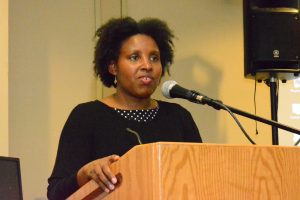- About Ramapo
- Academics
- Admissions & Aid
- Student Life
- Athletics
- Alumni
- Arts & Community
- Quick Links
- Apply
- Visit
- Give
GENOCIDE SURVIVOR PROVIDES UPDATE ON EVENTS IN RWANDA AND BURUNDI
(PDF) (DOC) (JPG)February 1, 2017
MAHWAH, N.J. – On November 4, Eugenie Mukeshimana, Rwandan genocide survivor and founder of the Genocide Survivors Support
Network, provided an update on developments in her native country and neighboring Burundi. The Gross Center for Holocaust and Genocide Studies sponsored the event.
More than a quarter of a million people in Burundi have fled in terror as opposition militias plot their return. Without international assistance, humanitarian disaster looms. Like neighboring Rwanda, Burundi is made up mainly of the Hutu and Tutsi groups among whom an atmosphere of insipient violence and fear fueled by the legacy of the 1994 genocide in Rwanda looms large. As Mukeshimana explained, the fact that a good number of the Hutu who instigated and carried out the Rwandan Genocide fled to Burundi has complicated the situation.
Eugenie Mukeshimana was a bride who had studied accounting in high school and lived in Kigali, Rwanda’s capital city. In 1994, when she  was pregnant with her daughter, Mukeshimana’s life was turned upside down. An ethnic Tutsi, she and her husband went into hiding to stay alive as Hutu extremists began a campaign of genocide that would eventually claim a million lives.
was pregnant with her daughter, Mukeshimana’s life was turned upside down. An ethnic Tutsi, she and her husband went into hiding to stay alive as Hutu extremists began a campaign of genocide that would eventually claim a million lives.
Mukeshimana emphasized that, despite the outward calm, tensions emanating from the genocide and the year of ethnic conflict still remain in Rwanda. She questioned whether the informal gacaca courts convened to end the mass incarceration of Hutu perpetrators were an adequate judicial remedy. As she pointed out, the situation has resulted in survivors and their descendants being forced to live cheek-by-jowl with perpetrators. It is one of the principle reasons she herself still finds it too difficult to return, even for a visit.
When the genocide was over, Mikeshimana and her daughter survived, but she lost her husband, father, sister and many other family members. Over the years, Mukeshimana worked to rebuild her life and came to the United States in 2001 where she attended college and founded the Genocide Survivors Support Network. A resident of Baltimore, Maryland, she travels around the United States to educate people about the genocide in Rwanda and serves as executive director of the Network.
E-News Archives
| 2023 | 2022 | 2021 | 2019 | 2018 | 2017 | 2016 | 2015 | 2014 | 2013 | 2012 | 2011 | 2010 | 2009 | 2008 | 2007 |Copyright ©2024 Ramapo College Of New Jersey. Statements And Policies. Contact Webmaster.

Follow Us!